As I said last week, this was the heavy topic assigned to me at an Anglican-Orthodox conference in 2009. If you haven’t read Part 1, please do or you won’t make much sense of Part 2. Last week I described (humbly, I hope) Orthodoxy’s multi-cultural unity in “traditional Christianity”.
This week is trickier: How does the Orthodox Church remain faithful in all cultures? even in 1! When I first became Orthodox I tried to figure it out – couldn’t do it, gave up. I concluded it’s just the Holy Spirit, which is the real explanation, of course. However now, after almost 30 years Orthodox, I have some educated guesses about how the Holy Spirit does it.
“How do we teach traditional Christianity…?” was the question. This contains a false assumption. We Orthodox do not begin by teaching traditional Christianity.
Living Experience
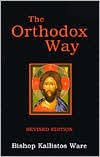 We learn traditional Christianity by living it, by experience. Early Christianity was called “the Way”, the way of life. Bishop Kallistos (Ware) in his book The Orthodox Way points out what is so obvious that we can miss it: The Creed isn’t primarily about doctrine. It doesn’t begin “I believe there is one God…”, but rather “I believe in one God…” “I put my trust in the one God.”
We learn traditional Christianity by living it, by experience. Early Christianity was called “the Way”, the way of life. Bishop Kallistos (Ware) in his book The Orthodox Way points out what is so obvious that we can miss it: The Creed isn’t primarily about doctrine. It doesn’t begin “I believe there is one God…”, but rather “I believe in one God…” “I put my trust in the one God.”
Experience, living it, is the key as it is with everything in life. I have faith in my wife not because I accept authoritative teachings about her, but because of experience: I have been married to her for over 51 years, and I know her – even though in many ways she still remains a wonderful, surprising, unexplainable mystery! But after all these years you could make arguments against her, use as much “form criticism” or “source criticism” on her as you like, and it wouldn’t affect me at all, because I know her.
Just so, Orthodox people are stable in the traditional Christianity because they are grounded in Orthodox life – which I’ll try to describe below. Only in that context is “teaching” the Faith effective. Saint Cyril of Jerusalem in a Pascha Monday talk to the newly baptized (which I can’t now locate) said something like this: “Yesterday you received the Eucharist for the first time; now I can begin to tell you what it means.” First experience it. Then we have something to work with.
Bishop Kallistos once baptized an Englishman who had intellectual doubts about parts of the Creed but who deeply wanted to live the Orthodox life. The man soon came to believe the Creed. First experience it. Then you will come to believe.
Orthodox people who are grounded in the Faith are therefore not often swayed by mere intellectual theories or arguments or TV preachers or (to get back to the subject at hand) by cultural influences to the contrary.
This is why, when people first came inquiring, I learned not to lead in with doctrine – especially with those who wanted to start with doctrine.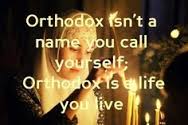 Rather I got them into our worship and prayer. I urged them to start fasting with the Church, get involved in the Church community, work at the parish festival, give to charity, practice mercy and forgiveness which are key. Thus they began to experience for themselves what traditional Christianity is all about. Then we had something to talk about.
Rather I got them into our worship and prayer. I urged them to start fasting with the Church, get involved in the Church community, work at the parish festival, give to charity, practice mercy and forgiveness which are key. Thus they began to experience for themselves what traditional Christianity is all about. Then we had something to talk about.
I’m writing here about the results when people actually experience traditional Christianity. It works. I know it does. I’ve seen it often. (More on that later.) But does this always happen? No. And far too many of our people fall away from the Orthodox Church because they have not been grounded in the Faith. Often (let’s be blunt) because they grew up in non-English-speaking churches where, as they became 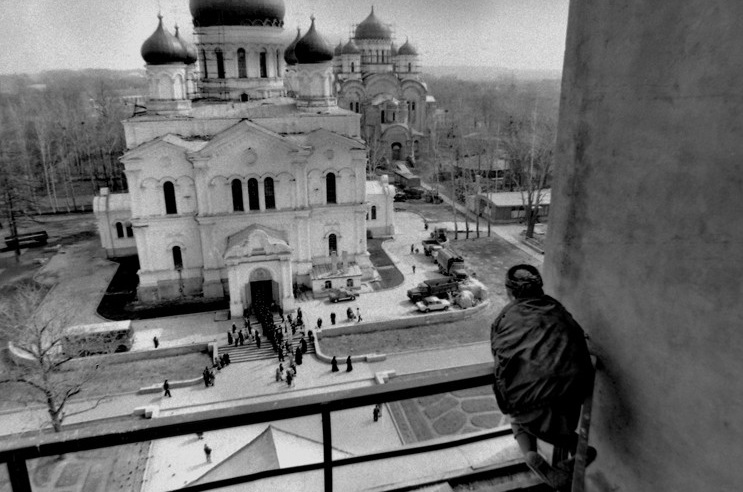 Americanized, they had no idea what was going on, and figured Orthodoxy was just some ethnic club. I’m afraid many went elsewhere just to hear about Jesus. Others were swayed by today’s powerful secular influences (often when they stopped going to church in college), or sometimes it was the desire to be part of the religious mainstream in our very non-Orthodox society. Others abandoned Christianity entirely. I’ve heard faithful Greek Orthodox speak about a whole “lost generation”. It’s not easy to be Orthodox here. We’re going to have to fight for it
Americanized, they had no idea what was going on, and figured Orthodoxy was just some ethnic club. I’m afraid many went elsewhere just to hear about Jesus. Others were swayed by today’s powerful secular influences (often when they stopped going to church in college), or sometimes it was the desire to be part of the religious mainstream in our very non-Orthodox society. Others abandoned Christianity entirely. I’ve heard faithful Greek Orthodox speak about a whole “lost generation”. It’s not easy to be Orthodox here. We’re going to have to fight for it
Others have left for non-cultural reasons: because of clergy failure, or because in their parishes people fought like cats and dogs, or their families had religious dissension or divorce, or when they marry non-Orthodox. And more. But my limited observation is that people rarely leave if they have been truly grounded in Orthodoxy.
Here is what the Orthodox experience consists of:
1. Continuity in Traditional Christianity.
Traditional worship, prayer, doctrine and moral life which are continuous from the early Church without a break. The Divine Liturgy has been celebrated in our churches every Sunday from the beginning. The basic forms for the Divine Liturgy go back to at least the 4th century, and the core texts almost certainly much earlier. The teachings of traditional Christianity are found in the words of the Liturgy. All we have to do is pay attention for 50 or 60 years and it begins to sink in! Our Scriptural lectionary goes back to the early Fathers. So every Sunday our people see that what we do and teach is what the Church has always done and taught. Thus they know it’s not all going to be turned upside down by the next priest or bishop or pope or movement or liturgical commission. In fact our problem is that Orthodox people can be too unbending, but that’s another story.
2. Faith grounded in the “Nous”
This is hard to describe, because there is no adequate English word for it, and in Western thinking the concept is almost absent. “Nous” (νοῦς) is “spiritual (or soul) perception” – sometimes inadequately translated as “intuition” or mistranslated as “reason”. Nous is what is perceived in the “heart”, which in Orthodox usage means the depths of our being. Nous explains why a man and woman just know they are meant for each other. Emotion and intellectual inquiry alone don’t explain most marriages! “Nous” explains why when I first met my wife, I knew deep inside me that she was “the one” – and why in 51 years, through ups and downs, thicks and thins, I’ve never had the slightest doubt about it. (My wife is going to kill me for twice using her as an illustration.) It is usually through Nous that God calls men to ordination, though they know they are inadequate. When people love Jesus, are devoted to God and the Church all their lives against all odds, it’s Nous at work. They know him, perceive him and his reality in the depths of their being. Western Christians experience Nous, but when they don’t understand it, they can waste a lot of energy simply teaching or trying to get control or working up ephemeral emotions, instead of letting God work on the soul.
3. Orthodox people as Guardians of the Faith.
An Orthodox priest once said to me, “Orthodox people just know who they are.”
Let me tell you one of my favorite stories. Some years ago a man who had denied most of the Faith was being made bishop in a certain church. An Orthodox man from eastern Europe was visiting at the time, and his English host asked him: Could this happen in your country, that someone who denies the resurrection be a bishop? The Orthodox said No. His host asked Why not? wondering what is the Orthodox ecclesiastical system for dealing with heresy? The Orthodox man answered:  “In my country if a bishop denied the resurrection, the people would take him and throw him in the river.” (A bit excessive perhaps? But for a man who stands in the altar, and lies when he says the Creed…?)
“In my country if a bishop denied the resurrection, the people would take him and throw him in the river.” (A bit excessive perhaps? But for a man who stands in the altar, and lies when he says the Creed…?)
We do have a system of ecclesiastical control. If a pastor should deny the Faith and refused to repent, his bishop would remove him. If the congregation should accept his heresy, the bishop would take away the parish’s antimension below – the cloth lying on the altar of each Orthodox church which authorizes us to celebrate the Divine Liturgy. But if I denied the Faith (I 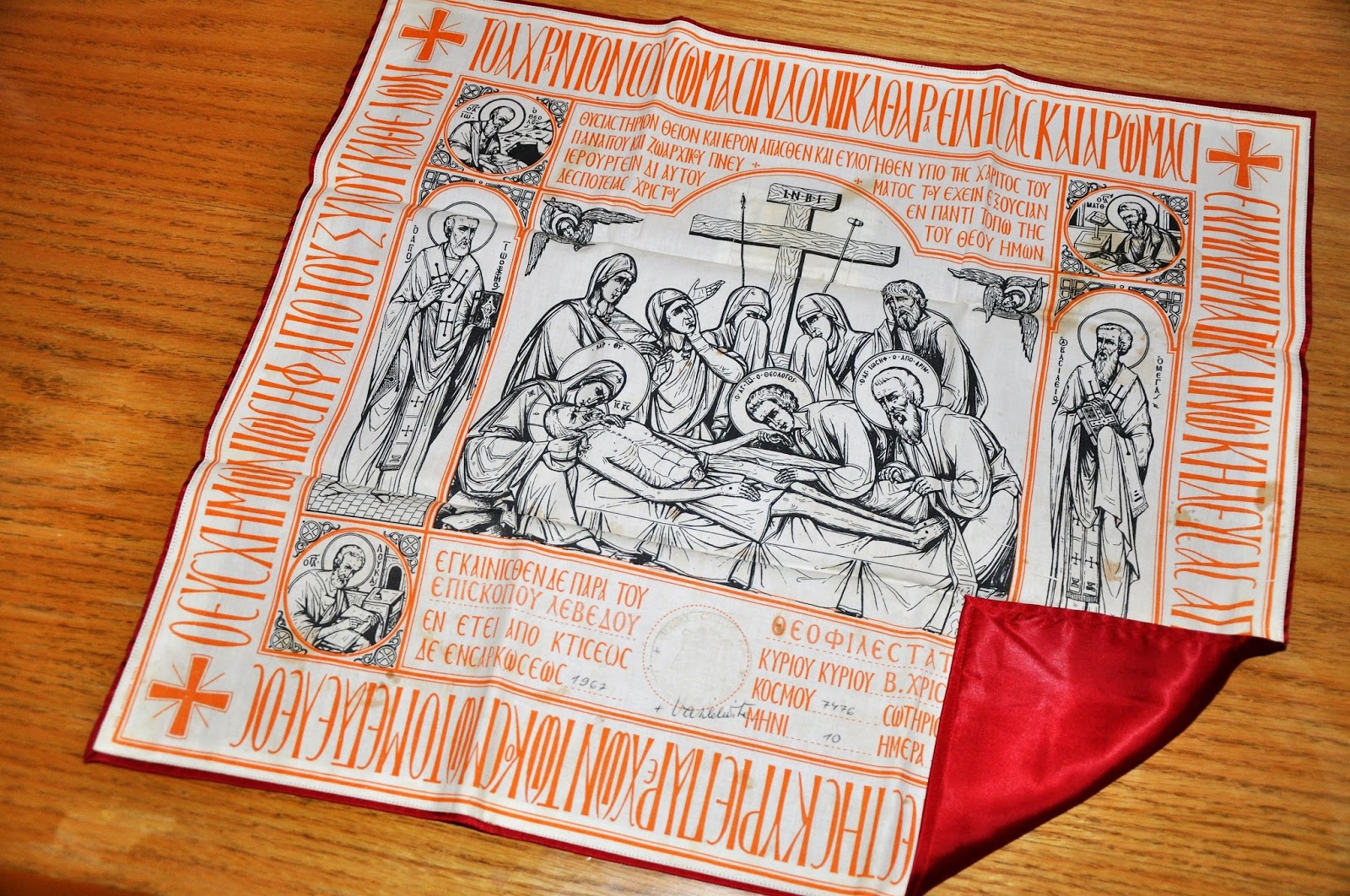 won’t!), before the bishop got here I would be in the Milwaukee River. Likewise if a bishop denied the Faith, the people of the diocese would not put up with it, and if he was unrepentant, ancient canon law directs them to leave him and affiliate with the nearest Orthodox bishop. In the Orthodox Church, authority lies in all the people, not just the bishops. All Orthodox people are Guardians the Faith.
won’t!), before the bishop got here I would be in the Milwaukee River. Likewise if a bishop denied the Faith, the people of the diocese would not put up with it, and if he was unrepentant, ancient canon law directs them to leave him and affiliate with the nearest Orthodox bishop. In the Orthodox Church, authority lies in all the people, not just the bishops. All Orthodox people are Guardians the Faith.
Even when our bishops speak about lesser matters, the first reaction of their people is usually not instant obedience but rather to evaluate it – sometimes to the frustration of our bishops. As one bishop told me, there is always a sort of “dialectic” between Orthodox bishops and their flock. One advantage of this: If you wanted to try to revise the Orthodox Faith or alter our worship, where would you start?!
4. The Church community
Someone wrote that when Western Christians hear the words “Body of Christ” they think first of the Holy Eucharist, then of the Church. But when Orthodox Christians hear that term they think first of the Church, then secondarily of the Eucharist. This is not to denigrate the Holy Eucharist – far from it. The Divine Liturgy is the heart of Orthodox life. But the Eucharist belongs to the Church. In the Orthodox Church, no priest has personal power to celebrate the Divine Liturgy. Orthodox clergy have authority only within the Church.
I always believed that the Church was the Body of Christ, but after I became Orthodox I experienced it: Christ reaching out to  me and supporting me
me and supporting me  through my brothers and sisters, just as he reaches out and feeds me in the Holy Eucharist. Our children receive the Eucharist as soon as they are baptized, so they grow up knowing they are fully members of the Family. A community of people all grounded in the Faith, supporting each other in “traditional Christianity”.
through my brothers and sisters, just as he reaches out and feeds me in the Holy Eucharist. Our children receive the Eucharist as soon as they are baptized, so they grow up knowing they are fully members of the Family. A community of people all grounded in the Faith, supporting each other in “traditional Christianity”.
5. Communion Discipline
What guarantees that we at Saint Nicholas, Cedarburg, are genuinely Orthodox, “traditional” Christians? It’s not because we believe we are. It’s because our Orthodox Bishop Anthony “authenticates” us by celebrating the Divine Liturgy with us. How do we know he is truly Orthodox? Because he is in Communion with our Archbishop Metropolitan Joseph, who is in Communion with our Patriarch Ignatius IV of Antioch, successor to the Apostle Peter. We know the Patriarch is authentically Orthodox because he is in Communion with heads of all other Orthodox bishops and Churches in the world today, and down through the centuries. You can see that our bishops are not primarily a succession of authority but rather a succession of “authenticity”. If a bishop were to fall into heresy, the other Orthodox bishops would no longer recognize him as Orthodox and would break Communion with him. This guards the Faith. At least this is how the process should work. As I told you, we’ve had no heretics and no opportunity to test it in over a thousand years! (Unfortunately, bishops also break Communion for lesser reasons, as at present. Pardon me for correcting Patriarchs, but this should not happen.)
And then within our parishes, only members in good standing in the Orthodox Church receive the Eucharist. If any of our members knowingly denied some part of the Faith or promoted or participated in immoral behavior, the priest would quietly tell them not to receive Holy Communion till they repented. This is our sign that we are committed to the Faith, the guarantor of Orthodox unity in “traditional Christianity”. (Non-Orthodox receive a blessing, a smile, and some  “antidoron”, Ἀντίδωρον – literally “bread in place of the Bread”. We hope they understand. Some don’t.)
“antidoron”, Ἀντίδωρον – literally “bread in place of the Bread”. We hope they understand. Some don’t.)
How we “apply” Orthodox experience in practice?
Different Orthodox parishes take very different approaches to this.
Some are still “Old Country” or at least “a pale shadow” thereof (as Patrick put it in last week’s comments) and seem off-putting to seekers – yes, though some go out of their way to be friendly. But all non-Anglo churches have gone through this period of moving into our society. I remember very ethnic non-English-speaking Lutheran and Evangelical churches only 50 years ago. Immigrants at first usually feel the need to cling to each other and their old ways. Finally they begin to feel at home here, and move into our culture. This is a difficult transition: “Should we go fast and lose some of our old people, or move slowly and lose some of our younger folks?” Finally they settle in and realize they have something to contribute to our society. This process does happen. 50 years ago I looked at Orthodoxy, visited a few Orthodox churches and thought “You’ve got to be born into this!” 30 years ago things were changing, and there was a place for me.
Other congregations are now made up almost entirely of new Americanized converts. As the “Evangelical Orthodox” of 35 years ago became Orthodox, for a while their parishes had a distinct evangelical feel, which made many cradle Orthodox uncomfortable.
Others, like our Saint Nicholas, Cedarburg, are diverse. We have approximately 1/2 Americanized converts of various backgrounds, 1/4 second and third generation Greeks, and 1/4 Arabs who are mostly 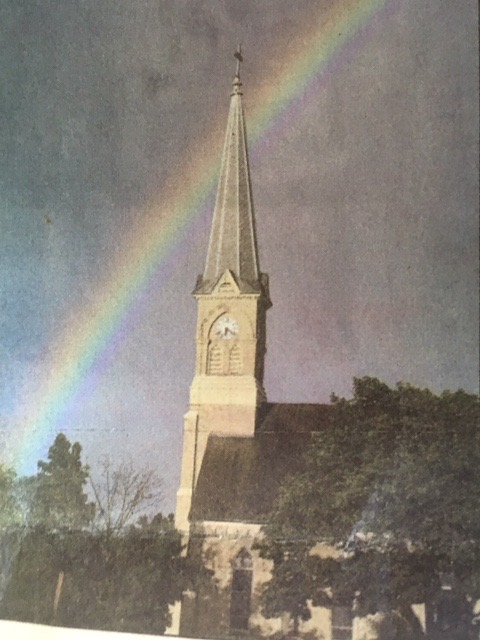 immigrants from the Middle East. This has been a healthy mix. Our “cradle” Orthodox have seen the Faith anew through the eyes of converts and have realized what a treasure they have. We new guys have learned from the cradle Orthodox how Orthodoxy is actually practiced – for example, that our fasting rules are “maximalist”, some of them meant only for monastics – and therefore we in the world needn’t collapse from hunger during Holy Week! We bought a hundred-year-old Lutheran building. Someday we’ll put a dome on top, but “inside” things first.
immigrants from the Middle East. This has been a healthy mix. Our “cradle” Orthodox have seen the Faith anew through the eyes of converts and have realized what a treasure they have. We new guys have learned from the cradle Orthodox how Orthodoxy is actually practiced – for example, that our fasting rules are “maximalist”, some of them meant only for monastics – and therefore we in the world needn’t collapse from hunger during Holy Week! We bought a hundred-year-old Lutheran building. Someday we’ll put a dome on top, but “inside” things first.
At Saint Nicholas we are building what we call a “Midwestern Ethnic church.” Here’s how we’re applying the Orthodox Way for our community, while trying also to reach out to the world:
1. We worship in English, which unifies us and teaches the Faith. We have much congregational participation, according to early Church practice. We sing traditional Byzantine and some Russian music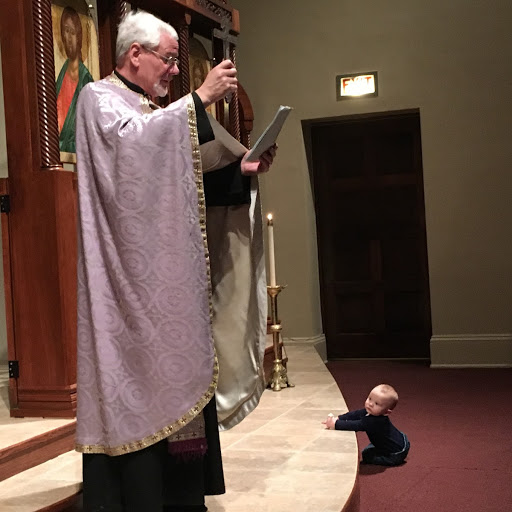 (often the simpler forms as we’ve learned it and so we don’t terrify visitors) in order to ground our people in Orthodox Tradition. Sunday Liturgy is at least 90 minutes long, and our children stay for it, so they can experience and learn to worship. We do not adapt to the culture around us. Our people adapt themselves to the Church and the Faith. Left: Someone escaped and is very eager for Father David’s blessing.
(often the simpler forms as we’ve learned it and so we don’t terrify visitors) in order to ground our people in Orthodox Tradition. Sunday Liturgy is at least 90 minutes long, and our children stay for it, so they can experience and learn to worship. We do not adapt to the culture around us. Our people adapt themselves to the Church and the Faith. Left: Someone escaped and is very eager for Father David’s blessing.
2. We push our youth to go to Archdiocesan or Diocesan summer camp. There for a week or 2 they experience intense Church life – twice-daily worship, faithful teaching, close community and a lot of fun. This usually creates life-long Orthodox friends. Some even get married eventually!
3. In this context, teaching the Faith works. We have adult and youth classes. 10 or 12 of our people have taken our Archdiocese’s substantial 3-year Saint Stephen’s program of theological study. We priests preach the Gospel at every Divine Liturgy. We try to present the Faith positively. There is so much negativity around us today, and we definitely don’t wish to conform to that part of current American culture! That would attract nasty negative minded people, and we don’t want that.
4. We encourage both old country and American customs, so that peoples’ beloved cultural ways are incorporated into parish life. You should come to our Pascha celebration with baklava, kibby, lamb, ham, pizza, bratwurst and more!
Otherwise all we have done at Saint Nicholas is ground our people in normal Orthodox experience. In this unitive context “teaching traditional Christianity” is simple and easy. All we have to do is try to be what the Church is, do what the Church does, teach our people what they already believe.
OK… we’ve also done something that is not common among Orthodox, at least in America. We give lots of money away – each month, right off the top, 10% to the Archdiocese, 10% to charities, plus collections for special causes. We do this so we won’t have to waste God’s good time worrying about money. “God never allows anyone to outdo him in giving.” Therefore from the earliest days of Saint Nicholas, we’ve never had to leave a bill unpaid, and our church building is paid off.
So back to the original question:
I can only speak for what’s happened at Saint Nicholas.
1 Are we “teaching traditional Christianity”? I’ve seen us converts quickly becoming devout Orthodox in mind and spirit and action. I’ve seen many of our cradle Orthodox coming more alive in the Faith. I see many peoples’ lives being changed for the better, including (I hope) mine.
 2. Are we “accessible to culture”? Many but not all of our people are college educated. We have educators, teachers, lawyers, doctors, nurses, a midwife, salesmen, homemakers, secretaries, artists, psychotherapists, financiers, computer types, owners of businesses (both small and large), and more – a good balance of people of all political
2. Are we “accessible to culture”? Many but not all of our people are college educated. We have educators, teachers, lawyers, doctors, nurses, a midwife, salesmen, homemakers, secretaries, artists, psychotherapists, financiers, computer types, owners of businesses (both small and large), and more – a good balance of people of all political ![]() opinions. (I once overheard 2 men talking politics at coffee hour, an Anglo Milwaukee socialist and a Greek arch-conservative. They left, still good friends, united in the Faith.) We have welcomed Chinese- and African-Americans with no issues. Among our converts, 3 have become priests, 1 a deacon, 1 a hieromonk on Mount Athos. I’ve run on so long only to say I think Saint Nicholas is culturally a fair representation of this part of suburban/urban upper Midwest America, and that Orthodoxy is accessible to our culture here. For Saint Nicholas began 29 years ago with about 25 people. We now have about 225.
opinions. (I once overheard 2 men talking politics at coffee hour, an Anglo Milwaukee socialist and a Greek arch-conservative. They left, still good friends, united in the Faith.) We have welcomed Chinese- and African-Americans with no issues. Among our converts, 3 have become priests, 1 a deacon, 1 a hieromonk on Mount Athos. I’ve run on so long only to say I think Saint Nicholas is culturally a fair representation of this part of suburban/urban upper Midwest America, and that Orthodoxy is accessible to our culture here. For Saint Nicholas began 29 years ago with about 25 people. We now have about 225.
Likewise in America the Orthodox Church, though still very small (we were latecomers), is growing slowly. Sometimes not so slowly: our Antiochian Archdiocese has about 4 times as many churches as it had 50 years ago, many of them founded by converts – this while Christianity in America (especially the major denominations) has been declining.
3. Are we “selling out the Faith to our surrounding culture”? No way. In 29 years at Saint Nicholas we have never had even a single issue about doctrine or worship or morals. (I can’t begin to tell you how amazing this has been to me!) On the occasions when people have left us, it has not been because of the Faith.
So, does the Orthodox Way work? Judge for yourself.
Forgive me for allowing this Post to go on so long. I’m worn out from writing it!
Next Week something shorter and punchier for Hallowe’en – DEMONS!

“What guarantees that we at Saint Nicholas, Cedarburg, are genuinely Orthodox, “traditional” Christians? It’s not because we believe we are. It’s because our Orthodox Bishop Anthony “authenticates” us by celebrating the Divine Liturgy with us. How do we know he is truly Orthodox? Because he is in Communion with our Archbishop Metropolitan Joseph, who is in Communion with our Patriarch Ignatius IV of Antioch, successor to the Apostle Peter. We know the Patriarch is authentically Orthodox because he is in Communion with heads of all other Orthodox bishops and Churches in the world today, and down through the centuries. You can see that our bishops are not primarily a succession of authority but rather a succession of “authenticity”. If a bishop were to fall into heresy, the other Orthodox bishops would no longer recognize him as Orthodox and would break Communion with him. This guards the Faith. At least this is how the process should work. As I told you, we’ve had no heretics and no opportunity to test it in over a thousand years!”
I’ve just read about St. Mark of Ephesus and the Council of Florence. This description of “network” Orthodoxy is generally true, but there are occasions when the majority of the hierarchs collectively go astray. Bitcoin is secure because you would have to control the majority of the network to create false coins and it is really difficult to do because it is a distributed network, like Orthodoxy. However, if you could somehow isolate and shrink the effective network to a point where you do have control enough nodes, bad things can happen. Florence was a case where the hierarchy in Constantinople were isolated between the Turks and the Pope and they thought their best way out was union with Rome and acceptance of Papal authority and Catholic dogma. The network was almost fatally compromised. I would say that there has been a heresy within the last 1,000 years and it was a biggie.
Thanks, Kevin. A thoughtful comment. My reading is that the Council of Florence debacle is an example not of theological heresy, but of hierarchs who lacked intestinal fortitude. They were sent to Florence not to establish some heretical doctrine, but because the emperor was desperate for help from the West, and directed them to give in to Rome at any cost. God bless Mark of Ephesus. When the hierarchs returned home, Mark was a popular hero, and the others were quickly driven out of office. This was an example of laypeople in their role as guardians of the Faith.
I love that the uniting factor of orthodoxy is united doctrine and worship. As a Protestant I got pretty sick of doctrinal spats. Now I see monarchists, republicans, libertarians, and socialists all getting along great at coffee hour after liturgy. We are truly a family, and little political disputes don’t carry as much weight as true communion. It was mind blowing when I first experienced it!
Hey, don’t forget the Democrats! Yes, as a priest in the Episcopal Church, 50 years ago I could still take a fair amount of doctrinal commonality for granted, especially in our Anglo-Catholic Diocese of Milwaukee. It all went away, and I was forever fighting to pull the parish together in the Faith – and my church had lovely people. I also, when I became Orthodox, could not believe it. So great not to argue about high church, low church, etc.